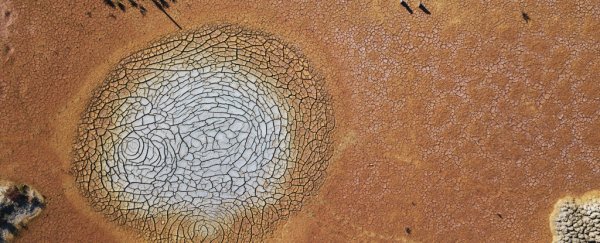Thousands of years of history tell us drought is nothing new. Sometimes we prevail. Often we don't.
A bleak look into the future tells us we've seen nothing yet, with a mix of shifting climates, poor water management practices, and growing population densities promising a ' pandemic' of catastrophic droughts awaits.
The UN's Special Report on Drought 2021 details the risks we face in coming years as a result of reduced rainfall in key spots around the world, exploring the drivers behind drought and the variety of measures we all take to cope with water shortage.
The fact global warming is redistributing our water is already a grim reality many around the world are forced to deal with.
"With human-induced climate change, drought frequency and severity have already increased in some – often already water-scarce – regions of the globe," the authors write in the report.
"As the world moves seemingly inexorably towards global average temperatures 2°C warmer than pre-industrial levels, drought impacts are intensifying and are predicted to worsen in many regions, particularly within business-as-usual scenarios."
At least 1.5 billion people around the world have been affected by drought over the past two decades, costing economies more than $124 billion.
As the authors point out, there's usually a gap between reported losses and actual impacts, meaning figures like these should be taken as conservative at best. Not to mention the fact estimates don't even take into account the economies of developing nations.
Somewhat ironically, it's developing nations and remote regions that first come to mind when we think about severe drought.
Yet nearly a fifth of the world's population live in an area potentially at risk of water scarcity. By the end of the century, we can expect most countries to be touched by drought in some way.
Reports predicting the extent of increasing risks of water shortages in a future ravaged by a climate crisis have become commonplace. Omens of drought barely qualify as news these days.
But given we know all this – given we know how devastating drought can be, and that so many of us face a future of dry spells – why aren't we better at managing it?
In an attempt to come up with an answer, the UN report assembled a number of case studies detailing 'lived experiences' of drought to highlight who in the community will be most affected by frequent periods of water stress.
Empowering those involved with agriculture is an obvious first step. But anybody with a need for a healthy aquatic environment, whether operating in tourism, transport, hydroelectricity, or fishing, has a stake in efficient water management.
Based on experiences gathered in these cases, it's clear that the politics on water aren't so much an issue with poor awareness, but a problem with bad memory.
"Current risk management and governance mechanisms and approaches addressing drought are being overwhelmed by the increasingly systemic nature of drought risk," the report states.
"The case studies describe action in policy development, review and restructure when droughts are severe, and inaction when droughts are no longer evident."
Nobody wants to think about the next drought when the rains come, so it's hardly surprising that most political approaches are reactive, as opposed to proactive.
The UN secretary general's special representative for disaster risk reduction, Mami Mizutori, is quick to compare future water shortages with a global disaster we don't need to imagine.
"Drought is on the verge of becoming the next pandemic and there is no vaccine to cure it," quotes The Guardian's Fiona Harvey.
Mizutori's analogy with COVID-19 should resonate. Social inequality, lack of preparation, and difficulty adapting to novel risks have only compounded what is effectively a challenge we've faced frequently in the past.
But just as a healthy immune system benefits from a long-term memory of past illness, our global community can't afford to forget the communities that faded from history for want of reliable access to fresh water.
Read the Global Assessment Report on Disaster Risk Reduction: Special Report on Drought 2021 here.
